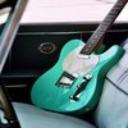Yahoo Answers is shutting down on May 4th, 2021 (Eastern Time) and beginning April 20th, 2021 (Eastern Time) the Yahoo Answers website will be in read-only mode. There will be no changes to other Yahoo properties or services, or your Yahoo account. You can find more information about the Yahoo Answers shutdown and how to download your data on this help page.
Trending News
How can I improve kick drum control and speed without a pedal?
I'm a drummer who has been playing for 10 years and I practice A LOT... however, having met other drummers, I really don't think my playing reflects then years I've put in. Mainly because all I have is a practice pad.
My kick drum control is just shocking and I want to improve, but my parents don't really support my musical side (and I'm still looking for a job)... so I'm forced to practice on a pad and the floor.
But the moment I step on the kit, while my hand control is fine due to pad work... my feet just don't work AT ALL.
Stomping the ground IS NOT THE SAME as using a pedal :(.
Are there any exercises I can do to improve control and speed without a kick pedal?
2 Answers
- OU812Lv 75 years ago
Sorry but I do not agree with David's approach to this issue. First off, most drummers do not use the heel - toe method. Most drummers do play heel up. Not to say one or the other is right for any one drummer, but to make it sound as if heel - toe is somehow the standard is beyond incorrect.
Second, practicing without a pedal will do you no good, period!! Speed and control on the bass drum, much like on any other drum, has to do with controlling the bounce from the initial strike. For instance when trying to do fast sixteenth notes on bass drum, it is all about being able to catch that bounce from the first hit and turning that into a double stroke basically. So if you play drums obviously you have a bass drum pedal but just need a way to practice quietly. And the answer to that issue is getting a practice pad for bass. Here you go...problem solved.
- David ALv 75 years ago
Before I even had a pad I practiced for hours on a toy drum with toy cymbals and had no bass drum or high hat. But I did practice with my feet on the floor. "Stomping the ground IS NOT THE SAME as using a pedal" is the way you put it, and while that is true, the coordination of your 4 limbs is an important part of playing drum set. For that reason, as well as building control and speed, it is important not to shirk from practicing without the pedals.
However, don't "stomp on the ground"! Use a rocking motion with your feet. Go heel to toe and pretend there is an axle through your ankle to rotate your foot around. You can help your time-keeping by doing (in 4/4 meter) toe down on beat one & three with your bass drum foot and heel down on beat two & four. Do just the opposite with your high hat foot- toe down on beats two & four and heel down on beats one & three.
After you get coordinated with that, develop speed by doing toes down on the beats and heels down on the "&" between the beats with your bass drum foot and the opposite with your high hat foot.
When you get on the set, be sure to use the same rotation method with your heel-toe motion. Some drummers who are only concerned with speed and power use only their toes on the pedals. However, some control is lost and that method leads to muscle fatigue and other problems such as loss of dynamic control. (Some rhythms require a muffling effect by holding the beater against the bass drum on some notes.)
There could be another problem concerning your "shocking kick drum control"- the equipment! You do not go into detail about the kit you are playing on, but it could have been purchased by someone who knows nothing (or little) about drum equipment. (For instance a set at church or at school.) To keep costs down, some manufacturers use cheap pedals (and other hardware) on flashy drum kits. I can tell you from experience that such pedals can be very difficult to use.
Good luck finding that job and happy playing.
Source(s): years in the biz





